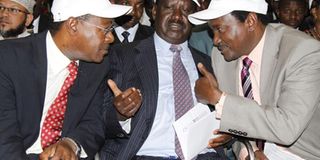Jubilee must learn to walk away from some battles

Cord leaders, from left, Moses Wetang’ula, Raila Odinga and Kalonzo Musyoka at Ufungamano House in Nairobi on August 13, 2014. Wetang'ula has said the three leaders will battle it out for the coalition's presidential ticket. FILE PHOTO |
What you need to know:
- Inertia: How can issues, over which the country previously fought, suddenly cease to be important?
- Whatever its merits, a referendum has its limitations.
The fourth anniversary of the new Constitution coincides with a push to amend the document through a referendum that Okoa Kenya, allied to the opposition coalition Cord, has called for.
The governing Jubilee coalition opposes the referendum and has since pressured its governors, who initially wanted a referendum of their own, to drop their demand and to even condemn the idea.
The opposition did not start out seeking a referendum, and only did so when Jubilee rejected the demand for a national dialogue which is what they had initially sought.
It seems that the opposition and the government are incapable of wanting the same things. Whatever one of them wants happens to be the opposite of the preferences of the other.
What we are witnessing in the country is a power struggle. Initially the opposition gave the government all the space in the world, to the extent that the opposition was perceived as dead.
The opposition then returned with a bang and, since then, there have been complaints that its activities go beyond what is expected of an opposition and are calculated to bring paralysis and ensure that the Jubilee Government falls.
Other manifestations of the power struggle include the defiant posture that the opposition has adopted in its relationship with the government.
For example, in what shook the Jubilee establishment to the core, opposition leader Raila Odinga received a presidential welcome on his return to the country after a long absence in the United States.
This was followed by a series of provocative speeches by the opposition, many of which badly denigrated the President personally, and the declaration of Saba Saba as a public holiday, regarded as the ultimate incitement.
The opposition activities have had an effect, putting the President on the defensive, and forcing him to assert that there can only be one president at a time. There have also been strong reactions by his supporters, saying they are willing to die to preserve his presidency.
CROWDED OUT
In healthy political competition, the government would be expected to view the call for a referendum as being a legitimate and constitutional pursuit and would, therefore, allow the opposition the space to organise the referendum.
Instead, the government has crowded out opposition space and has begun an offensive of its own designed to neutralise the referendum and ensure that it does not succeed.
The President’s generosity towards county governments, whose share of the national budget he voluntarily increased, reportedly to 43 per cent, the largesse to members of county assemblies, who have been promised creature comforts of their own, and the proposal to use the courts to invalidate the planned referendum, are some of the efforts made by the Jubilee side to defeat the referendum.
Just as the opposition has refused to allow the government the space to govern, the government has also refused to allow the opposition the space to organise, producing a mutually hurting stalemate.
If the referendum is uncalled for, as Jubilee claims, knee-jerk decisions to counter it will create an enduring financial burden on the population.
SECTIONAL RIVALRY
Despite a new constitution, Kenya is exactly where it was in 2005, when sectional rivalry created fissures that matured into the violence of 2007.
In 2005, many people sensed that there was significant trouble ahead but the country carried on, ignoring the ominous signs.
Similarly, Jubilee has so far downplayed the on-going power struggle, refusing to acknowledge the grievances that drive it, and characterised Kenya’s choices as being between “noise” for which the opposition is responsible, and “development” for which Jubilee is the specialist, a portrayal that is insulting and false.
The two most important issues that drive the ongoing power struggle are, first, accountability around the 2013 elections and, secondly, difficulties in inter-ethnic relations.
Kenya went to war over these two issues in 2007/2008. How can issues, over which the country previously fought, suddenly cease to be important?
Both the Kriegler Commission and the new constitution offered solutions which were to be implemented in the 2013 elections.
However, there has been no inclusive review of whether these solutions worked. While both the IEBC and Jubilee are satisfied with what happened, the opposition is aggrieved, and cannot achieve closure or organise for 2017 without a meaningful discussion.
REFERENDUM HAS LIMITATIONS
The national dialogue that Cord initially demanded would have provided the opportunity to talk about these issues. Whatever its merits, a referendum has its limitations and is not exactly a substitute for a national dialogue. Okoa Kenya would have to be careful to ensure that its drive for a referendum does not obscure the need for a dialogue.
As the country reflects on the ongoing political stalemate, it is important to note that it takes two sides to create a power struggle. The Jubilee Government and the opposition Cord are equally involved in the struggle and are equally responsible for the consequences.
Secondly, Jubilee must learn that it does not have to engage in every fight to which it is invited by Cord and must learn to walk away from some battles.
Thirdly, as the government, only Jubilee can rise above the power struggle by creating new frontiers of engagement. The manner in which Jubilee chooses to engage on the referendum will have a direct effect on its standing with the general population, and, therefore, its capacity to lead the country credibly.
If Jubilee engages cynically, this will only compound the existing difficulties and exacerbate the power struggle.




